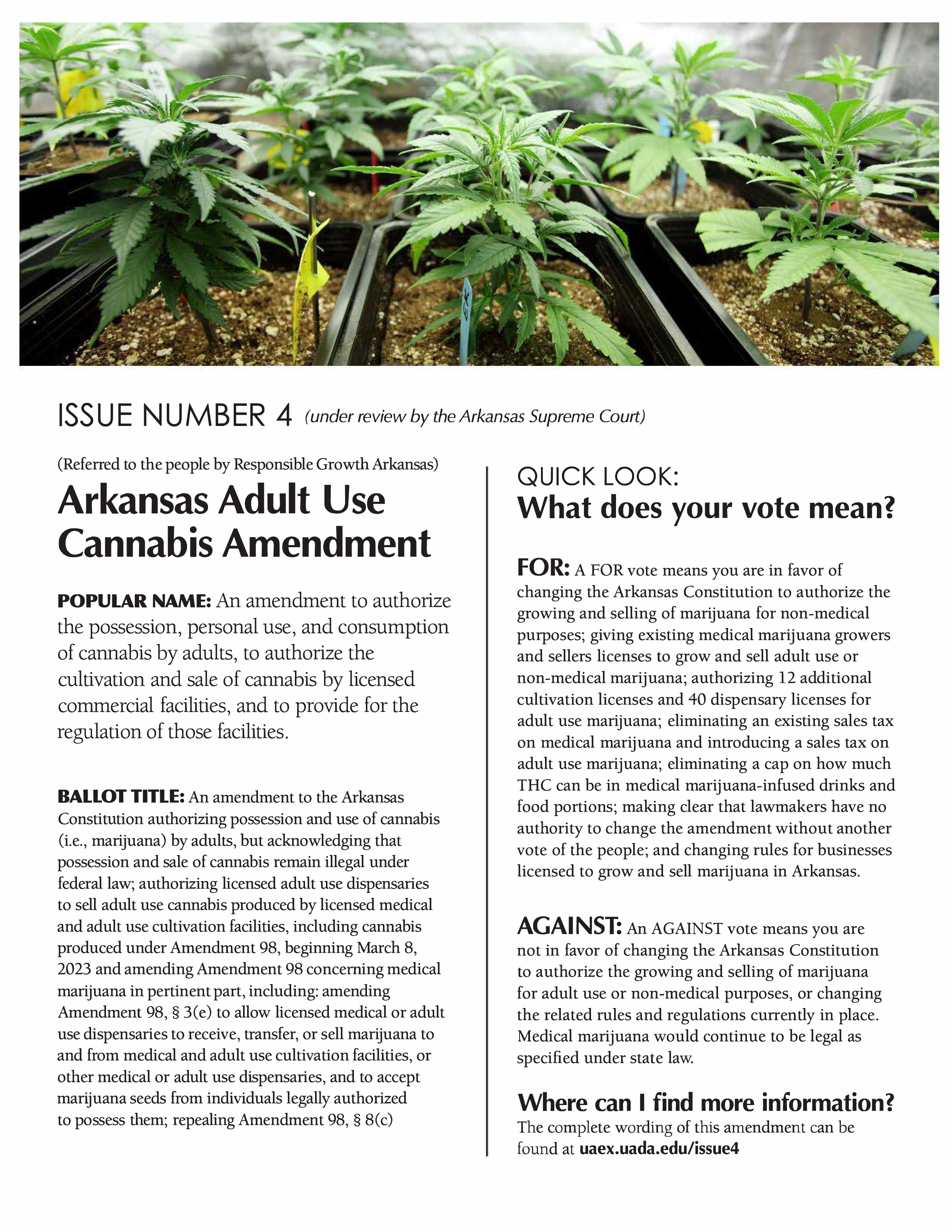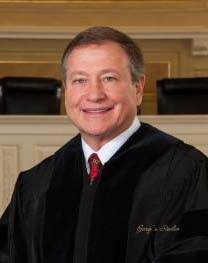Ballot Issue: Arkansas voters to decide on constitutional referendum to legalize recreational marijuana.
October 3-9, 2022
By Wesley Brown
Nearly six years after Arkansas voters overwhelmingly approved a ballot amendment to allow the use of medical marijuana in the Natural State, the Arkansas Supreme Court has approved a ballot issue for November to open the door for recreational use of the leafy drug.
In a 24-page decision, the state’s highest court reversed an Aug. 3 decision by the State Board of Election Commissioners (SBEC) to deny certification of the constitutional amendment legalizing marijuana use for adults. Former Arkansas lawmaker Eddie Armstrong and Lance Huey with Responsible Growth Arkansas filed the petition asking the Arkansas Supreme Court to order the Secretary of State to certify the proposed amendment, known as Issue 4.
The SBEC is comprised of the Secretary of State as chairperson, two members appointed by the governor, and one member each appointed by the chair of the state Democratic party, the chair of the state Republican party, the President Pro Tempore of the Arkansas Senate, and the Speaker of the Arkansas House of Representatives.
In early August, the election oversight commission turned back a proposed constitutional amendment to legalize recreational marijuana for adults over the age of 21. At the time, the seven-person panel raised concerns with the ballot initiative’s lack of explanation on the change to Clause 5 that would limit background checks for those who own less than 5% of a dispensary or cultivation license.
Election commissioners, including Arkansas Secretary of State John Thurston, also expressed concerns about the ballot initiative omitting changes to laws that limited how much tetrahydrocannabinol (THC) can be in products. THC is a chemical found in marijuana. The SBEC review of ballot petitions is among a volley of new election law changes approved by the Arkansas General Assembly ahead of the 2022 election.
Under Act 376 of 2019, the state Election Board replaced the attorney general’s office as the entity that approves ballot titles. Advocacy groups must not submit lists of signatures to the Board at the same time as they submit a proposed ballot title. If the Board rejects either the ballot title or the sufficiency of signatures, appeals to the state Supreme Court will be extradited.
At least four issues will now be on the November general election ballot. Three of those amendments were referred by the legislature during the 2019 regular session. All three are proposed constitutional amendments.
One would permanently extend the current half-cent sales tax that generates revenue for highway projects. It is a temporary tax that is due to expire in 2023 unless Arkansas voters approve the ballot issue. A second proposed amendment would change the current term limits provision in the state Constitution. It would impose a 12-year limit, but the limit would be for consecutive service and not for a lifetime. Thus, a legislator who served 12 years would have to leave office. But the lawmaker could run again under the proposed amendment after sitting out for four years.
The third measure, if approved, would change the process for citizens’ groups to have measures placed on the November ballot. It would move up the deadline for submitting signatures to January 15. Currently, the deadline is in early July.
Supreme Court Rejection
In its 5-2 majority opinion penned by Associate Justice Robin Wynne, the Arkansas high court rejected all claims concerning the “legal sufficiency” of the ballot issue after the Secretary of State determined that the proposed ballot measure was insufficient.
“We give the ballot title a liberal construction and interpretation in order that it secures the purposes of reserving to the people this power. And we recognize that it is impossible to prepare a ballot title that would suit everyone,” Wynne wrote in his conclusion. “With these standards in mind, we conclude that the ballot title at issue is complete enough to convey an intelligible idea of the scope and import of the proposed amendment.
“Therefore, Respondents and Intervenors have not met their burden of proving that the ballot title is insufficient,” Wynne continued. “The people will decide whether to approve the proposed amendment in November. Accordingly, we grant the petition and order the Secretary of State to certify the proposed amendment for inclusion on the November 8, 2022, general election ballot.”
Joining Wynne in the majority opinion was Chief Justice Dan Kemp, and Associate Justices Rhonda Woods, Courtney Hudson and Karen Baker. Justices Shawn Womack and Barbara Webb were the dissenting members.
Responsible Growth Arkansas, which filed the petition with the high court, has gathered more than 193,000 signatures, well over twice the 89,151 signatures required to make the ballot. In late July, Arkansas Secretary of State John Thurston confirmed that the group had the signatures to meet the requirement but publicly declared the proposal to legalize recreational marijuana as insufficient for inclusion on the November general election ballot in early September.
Now that Issue 4 has been approved to appear on the November ballot only weeks before early voting begins, several groups are already jockeying to get the attention of voters for the midterm elections.
According to the ballot proposal, adults 21 and older will be able to purchase and possess up to an ounce of cannabis if voters approve the measure. The initiative’s language does not permit for home cultivation, and it does not contain provisions to expunge past records or to provide for opportunities for social equity applicants.
The measure would also make a series of changes to the state’s existing medical cannabis program that was approved by voters in 2016, including a repeal of residency requirements to qualify as a patient in the state. Regulators would need to license existing medical cannabis dispensaries also to serve adult consumers, and also permit them to open another retail location for recreational marijuana sales only. Originally, a lottery system awarded licenses for 40 additional adult-use retailers.
Besides Arkansas, voters in four other states — Maryland, Missouri, North Dakota and South Dakota — will decide this Election Day on statewide ballot measures to legalize the use of marijuana by adults, according to the National Organization for the Reform of Marijuana Laws (NORML).
Currently, 19 states — comprising 44% of the U.S. population — have legalized and regulated adult-use marijuana markets. If voters approve these measures, nearly half of all U.S. residents will reside in a jurisdiction where the possession and use of cannabis are legal for adults.
According to a recent NORML poll, most of these measures enjoy majority support from the public. “Voters’ support for repealing cannabis criminalization crosses party lines,” NORML’s Deputy Director Paul Armentano said. “That is why, historically, these ballot initiative efforts have been equally successful at the ballot box in both ‘red’ states and in ‘blue’ states. We anticipate similar outcomes this November.”
In 2020, voters in Arizona, Montana, New Jersey and South Dakota approved similar adult-use legalization measures. South Dakota’s election results, however, were later nullified by the state’s Supreme Court. In 2016, California, Massachusetts, Maine and Nevada voters approved similar ballot measures.
Several of this year’s ballot measures faced protracted litigation by opponents who sought to have the measures removed from the ballot over perceived technicalities. Most of those efforts were unsuccessful; however, one such effort succeeded in postponing voters’ opportunity to decide a similar ballot question in Oklahoma.
“With public support for marijuana policy reform reaching super-majority status in recent years, prohibitionists and other political opponents have largely abandoned efforts to try and influence public opinion,” Armentano said. “Rather, they are now relying on anti-democratic gamesmanship to prevent voters from weighing in on the issue.”
In addition to these statewide efforts, voters in dozens of cities will decide on municipal ballot questions this fall. For instance, voters in five Texas cities — Denton, Elgin, Harker Heights, Killeen and San Marcos — will decide on measures seeking to amend local laws curtailing police officers’ authority to “issue citations or make arrests for Class A or Class B misdemeanor possession of marijuana offenses” absent a defendant’s alleged involvement in a “felony-level narcotics” case. Voters in several Ohio cities will also decide on municipal measures de-penalizing activities involving marijuana possession.
“These additional local efforts help create pressure from the ground up. We will be reaching out to voters in these localities to ensure they are registered to vote, know about the issues on the ballot and get out to the ballot boxes,” says Jax James, NORML’s State Policy Manager. “Between local and state efforts, these initiatives will affect over 18 million Americans.”
James also applauded the recent decision by Arkansas’ high court to reject ballot opposition to Issue 4. “With voters favoring this measure by two to one, we expect that Arkansas will join the 19 other states that have embraced this pragmatic cannabis policy. A regulated cannabis market allows for the reprioritization of law enforcement’s time and the growth of a new business market while protecting consumers.”
Arkansas opposition
Despite the expected support on the ballot for legalized marijuana, there is still strong opposition across several fronts. Late last month, the Arkansas Board of Corrections approved a motion that it was against approving the constitutional amendment to legalize marijuana. The seven-person governing board for Arkansas prison and corrections facilities, chaired by Benny Magness, is comprised of seven members appointed by the governor for seven-year staggered terms.
In addition, Gov. Asa Hutchinson has explicitly stated he will personally vote against Issue 4 in November. However, he said the Supreme Court’s decision earlier this month protects the right of Arkansas voters to decide whether to legalize adult-use marijuana. Still, Hutchison tweeted his opposition to the proposed referendum on Sept. 9.
“The science is clear. Recreational marijuana leads to increased drug use among minors & more dangerous roadways. This November, I’m voting NO on Issue 4 to legalize recreational marijuana in Arkansas & I hope you’ll join me,” tweeted Hutchinson, who served as head of the U.S. Drug Enforcement Administration (DEA) from 2001-2003.
Also, longtime Arkansas Family Council President Jerry Cox on Sept. 22 called the proposal to legalize adult marijuana use in Arkansas “a recipe for disaster,” noting that the measure specifically prohibits the state from requiring criminal background checks for certain marijuana business owners.
“Issue 4 is a misleading proposal to legalize marijuana in Arkansas. It was crafted and supported by the marijuana industry. If it passes, Arkansas arguably will have the most unregulated cannabis industry of any state in America. That could bring serious crime and drug problems to Arkansas,” said Cox.
Cox also said Arkansans need to understand that drug cartels and big businesses are driving marijuana legalization. “Marijuana is a multi-billion-dollar business. Drug cartels and shady corporations are cashing in on marijuana in states like Oregon and California. They clearly want to expand their market to Arkansas. We remain committed to fighting them every step of the way. Our state doesn’t need another drug problem,” he said.
Even though the sale of marijuana is still not legal at the federal level, tax revenues alone derived from the licensed retail sale of state-legal, adult-use cannabis products grew by more than 30% between 2020 and 2021, totaling over $3.7 billion last year — according to an analysis provided by the Marijuana Policy Project (MPP).
Since 2014, retail sales of adult-use cannabis products have generated $11.2 billion dollars, data shows. Adult-use sales generated the greatest amount of revenue in California ($1.3 billion), followed by Washington, Illinois and Colorado. Those figures do not include revenues derived from the sales of medical cannabis products and/or the collection of state-imposed regulatory fees.
According to data from the state Department of Finance and Administration, Arkansans spent $264.9 million on medical marijuana in 2021 with the state’s 37 licensed dispensaries. Since the first marijuana dispensary opened in May 2019, 89,983 active holders of medical marijuana patient cards approved by the state Health Department patients have spent more than $660 million to obtain 105,130 pounds of medical cannabis.
State tax revenue generated since May 2019 is $78.7 million. Roughly $62 million from that total was directed to UAMS.
Photo Captions:
2. Since the first medical marijuana dispensary opened in May 2019, the 89,983 active holders of patient ID cards approved by the state Health Department have generated over $630 million in cannabis sales.
3. Arkansas Supreme Court Associate (left) Justice Robin Wynne







